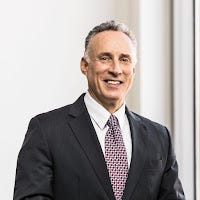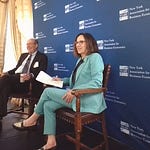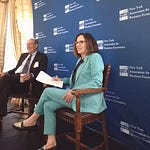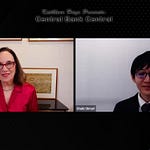Mark Chandler has been covering global capital markets for more than three decades with a deep knowledge of currencies and exchange rates which I have long leaned on to understand moves in The Mighty Dollar.
So it’s no surprise that on the day after the Trump team’s global tariff rollout, what the President has dubbed as “Liberation Day,” as the dollar tumbles against major and not-so-major currencies, and stocks of all kinds fall in markets around the world, that I reach out reach out to Marc to find out if this going to be as bad for the U.S. and global economy as the market response suggests.
Looking for an extreme comparison for historical context, I ask him, is this the biggest event since President Nixon closed the gold window in 1971? Take a look at what he says, much to my surprise.
”Wow, Kathleen, that's really an interesting parallel. I think it even might be bigger than that.”
So dive in and hear what this respected financial markets expert, professor, and author of “Making Sense of the Dollar” has to say. Bottom line: he sees recession ahead for the U.S. economy, and a much-reduced role for longstanding multinational institutions like the International Monetary Fund, the World Bank, and the World Trade Organization.
Is Trump’s Tariff Liberation Day Bigger than closing the Gold window? 00:01:50.950
Marc Chandler-Ans: Wow, Kathleen, that's really an interesting parallel. I think it even might be bigger than that.
Defecting from the Post-WWII IMF, World Bank, Order 00:01:56.940
I think that the world that was ushered in with these, I mean, I think, January 20th but maybe you want to say, with these reciprocal tariffs. I think that the world that we grew up with, but not just us, our parents and their parents, a world in which, after World War II was sort of led by the US. The multilateral approach. You think about the World Bank, the IMF, the World Trade Organization, you know the success of the GATT. And I think that what the US. Is doing now is defecting from this game, from these rule-oriented systems that it helped create so well after World War II. Of course, the dollar was the key currency. Everybody tied their currency to the dollar. The dollar itself was tied to gold. Nixon broke the last string between dollar and gold < in 1971>.
The New ‘Trump’ Order 00:03:13.400
And in the 2024 election, that old globalist elite was rejected. and I think that President Trump feels he knows he has a mandate and he's pushing it. His idea of tariffs goes back to (President) Mckinley. which is really back to like, say, early 1900s. And so I think that this is has bigger ramifications for US leadership and globalization going forward than just what seems a momentous of breaking the Bretton woods and Nixon decoupling the dollar from gold.
A ’Permanent Policy” or Temporary Tactic? 00:04:35.210
Marc Chandler: Yeah, I think that there's a lot of people I think, on in Wall Street, a lot of investors, a lot of people I talk to, who believe that believe that this is just a tactic, and the Us. Would not be foolish, so foolish as to shoot itself, not in one foot, but in both feet. I I'm not so sure…
Real Goal: MAMA? Make America Manufacture Again: 00:05:29.700
Marc Chandler: So I think that this is so to me. I think that trump has two goals, and it seems to me that only one of them will be achieved. and that that means that he can't really back down that much from these reciprocal tariffs. The 1st goal is to raise revenue to pay for not only the making his previous tax cuts permanent, but adding to them as he's, you know, as we've as we've seen him to just no tips on, no tax on tariffs. Excuse me, no tax on tips, no tax on overtime pay, maybe getting rid of the tax on social when you receive your social security checks To make these permanent. It's going to be a big fiscal hit, and so he wants the tariffs to raise revenue The less likely he can achieve his other target. Other goal, bring back manufacturing to the United States.
Trump goals in conflict- 00:06:21.620
So I think you can only get one of those if he brings back manufacturing in the Us. That means we're not buying as many imports, which means he's not raising the kind of revenue that that his administration is projecting.
Trump or not; jobs are not coming back 00:07:37.830
The idea of bringing back manufacturing the Us. I think that's possible. But it's not going to happen with a lot of jobs right now, the manufacturing sector employs about 7% of American workers. Why, I think it's because it's it's not that the jobs are going to China. China itself has lost manufacturing jobs. So who's got? Who got? Where are all these manufacturing jobs going? I think it's technology.
Causes of the US trade defict 00:12:35.290
I want to say that the current account deficit is a function of US savings and investment. The US consumes well, above what sort of well above our weight But even with this, so first, I'd say current account, the reason the dollar hasn't hasn't fallen isn't so much because foreign central banks are accumulating dollars because they more or less have stopped, and the best place to check for this is the IMF publishes a report at the end of every quarter called cofer, which is really you could put that in your search engine. But basically it's the IMF's most authoritative source of reserves. And you can see that they've actually been falling. Global reserves have actually been declining, not going up. So, it's not foreign central banks buying treasuries who are buying them.
The American Way is to use OPM 00:14:26.530
By investing more it means we have to borrow more money. So I think that the US. Has not become poor because of the current account deficit. This is what I think a lot of people don't fully understand. They see it's almost like underneath, you know, if you scratch us hard enough. We're almost like Germans or the Dutch, where the word bet and guilt come from the same root word in the Us. It's not the American way. I think the American way is OPM, Other People's Money.
Non-Tariff Barriers ae more complicated 00:16:04.520
Australia, President Trump cited Australia, not buying us beef. Yeah. It might be to help the Australian farmers. But maybe there's a legitimate case here where they're not convinced about how the Us. Treats the cattle, pumping them up with antibiotics, for example, or how we clean them or rinse them. So I'm not so sure that these countries are picking on the Us. But I do think that you're right, that the us has allowed other countries to fray the rules of the game.
The economy was weakening ahead of the Tariff shock 00:17:38.490
Tariffs can have two <impacts>. They have a contradictory impact, (1) boosting prices and (2) weakening demand…Many people, including myself, thought that the US economy was rolling over anyway. Typically, in the US. We don't have a recession in the 4th year of a Presidential term, as you can understand. But it typically comes in the 1st part of the next term. So many of us were looking for the economy to roll over. And so we were already like in that weakening state. You can see this from a lot of different numbers.
Global economy to suffer 00:19:20.410
So, it's not clear what a recession really is, except it's not good.
I do think that the US Economy is going to get hit on this. But I also think to your point. The world economy is also going to suffer, and I think that this is in some ways this is the 3rd big shock since the Covid crisis, the first, of course, Russia invasion of Ukraine, the second was the de-risking from China, and this, like what I think is like about face, a complete reverse course in the US. And not just on tariffs and trade, but on a whole range of things, you know. I think it was last week that the US stopped payments on its like annual dues for the World Trade organization. which is about 25 million dollars, which is a lot of money for you or me, but for the government budget, not even a rounding error <And then the Geopolitics…> …the way the US. Voted the UN siding with Russia over Europe on security issues for the 1st time. I think that's going to be like a toothpaste has come out of the tubes. American Trust, and we can't put it back in very easily.
Fed to cut rates in June or July 00:23:46.790
So when the Federal Reserve does cut rates, I think, in June or July for the 1st cut, that they that it will happen because the economy is weakening, especially through the labor market rather than prices, somehow coming off and meeting the target. I think it's pretty clear that the Fed wants to buy some more time. No one's saying, Let's cut rates at the May meeting. but I think that by the time we get to the June meeting or the July meeting, some of these things, like the layoffs, are going to begin filtering through, and we'll have a greater certainty about whether tariffs are really just a negotiating bargaining ship, or whether there's something that's going to
Fed and the ECB are in play 00:24:46.840
Marc Chandler: the market is pricing in a little bit more than 3 cuts. This year the market has turned more dovish than the Federal Reserve, and so I watch that that discrepancy between the fed and the markets as a bit of a tug of war. And so I think that that's the important aspect. Here is, the market is betting that the Federal Reserve is going to be having to cut rates, maybe more than they thought they'd have to. I think the reciprocal tariffs were a bit more than Europe had expected, especially when they come on back of the autos, the steel, the aluminum. And we're told that there's other industry, specific tariffs going to be forthcoming. My guess would be, and it's just a guess, of course, is that the ECB is likely to cut rates here in April, when they meet again, and I think that a combination of the tariffs or moderating inflation, but also the strength of the euro gives them that scope to continue their rate cutting. But at the same time, you know, Europe is also engaged in a big fiscal expansion led by Germany. They now are going to exclude defense spending from their debt break.
A world of trade and influence blocks 00:28:52.330
I think that the world's going to go back to where it was in the late 19th century, what was called at the time spheres of influence. where, instead of having this, the US, being the dominant power, making the rules and trying to enforce them for other countries. Then, instead, we're going to go back to these trade these blocks. A North American block, which I think, is why the real story about Greenland and Panama is from Trump trying to secure a North American Us. Centric block.
End of dollar up cycle 00:31:13.190
The dollar has been rallying. And that's what I like about the foreign exchange market… I think that this last this dollar rally, this big like super cycle dollar rally. I think it's coming to an end. I've been thinking so for a while, and we did make a peak say in the dollar index back in 2022. So it's been kind of iffy. But I think that the dollar's turned here, and I think that foreign investment I guess a good example would be in Europe. Europeans bought a record amount of Us. Stocks last year, almost 110 billion dollars worth. And now it looks like there's a bit of buyer's remorse. They're unwinding the Us. Equities. They're not necessarily buying European equities. but they are selling the dollar.
MARC CHANDLER
Marc Chandler has been covering the global capital markets for more than 30 years, including stints as the global head of currency strategy for both HSBC and Brown Brothers Harriman. Chandler joined Bannockburn Capital Markets as a Managing Director and Chief Market Strategist in 2018.
A prolific writer and speaker, Chandler appears regularly in the financial media. He is often quoted in the Financial Times, the Wall Street Journal, Barron’s, Bloomberg, and the Washington Post, among others. Marc also provides his insights and commentary on the markets on the most widely watched financial news channels, including CNBC, Bloomberg TV, CNN, and Fox Business.
Marc’s first book, Making Sense of the Dollar, was published by Bloomberg Press in 2009 and received a Bronze Award from Independent Publishers. Chandler's second book, Political Economy of Tomorrow, was published in February 2017.
Chandler is also an honorary fellow of the Foreign Policy Association and has been named a Business Visionary by Forbes.
Currently, Chandler has taught at New York University Center for Global Affairs, where he is an associate professor, and Fordham's Gabelli School of Business. He is also an honorary visiting professor at the Darden School of Business at the University of Virginia.















Share this post